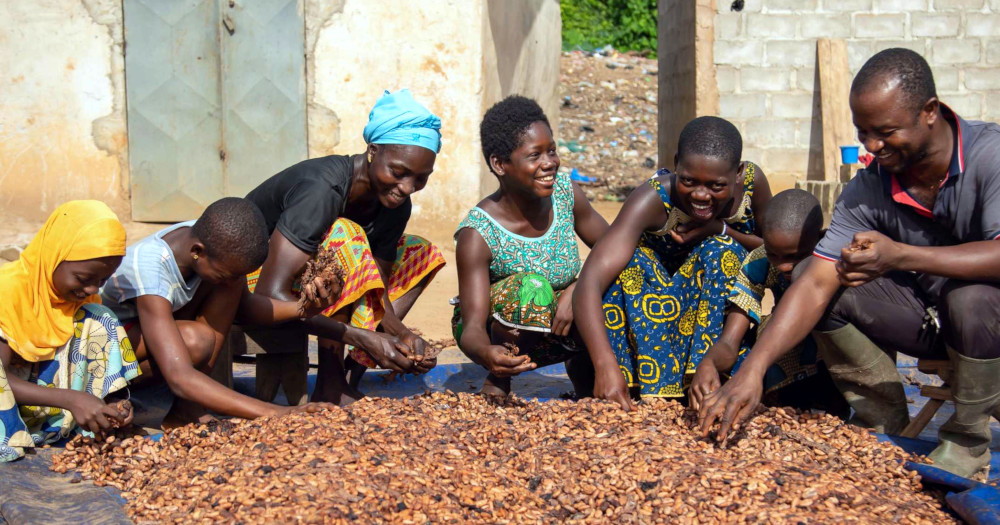Waitrose joins Tony’s Chocolonely’s mission to deliver 100 percent slave-free chocolate
 Image credit: Waitrose
Image credit: Waitrose
This week, UK retail giant Waitrose announced
the results of its partnership with mission-driven chocolate maker Tony’s
Chocolonely to source nine of its own-brand
chocolate bars through Tony’s Open Chain — an
industry-led initiative that’s helping chocolate brands transform their supply
chains through transparency — in turn becoming the latest “Mission Ally” to
support more sustainable cocoa sourcing throughout the industry.
The first UK retailer to come aboard, Waitrose joins global brands including
Ben & Jerry’s and Albert Heijn; fellow retailers such as Aldi,
HEMA and Jumbo; and fast-growing UK brands Huel and
Pleese as a Mission Ally. Waitrose’s full range — six
Waitrose chocolate
bars
and three Cook’s ingredients
bars
— are now available across all UK stores, and recognizable by the yellow Tony’s
Open Chain button on the front of pack.
By joining Tony’s Open Chain, Waitrose has committed to its 5 Sourcing
Principles —
including rigorous sourcing standards such as robust traceability, paying the
Living Income Reference
Price
for cocoa, and building long-term partnerships with partner cooperatives to
support farmers and develop thriving cocoa communities. As a collaborative
initiative, Mission Allies compete on chocolate but collaborate on ethical
cocoa.
“We’re proud to be the first UK retailer to join Tony’s Chocolonely in their
mission to end exploitation in cocoa, but we definitely hope we aren’t the
last,” said Waitrose Commercial Director Charlotte Di
Cello. “Joining as a Mission
Ally is crucial to helping set a new industry standard, in a world where
sustainability is no longer optional but essential, we want to not just meet but
exceed our customers' expectations for responsibly and ethically sourced,
high-quality food across the UK and international supply chains.”
According to the Tony’s Open Chain Impact Report
2022/23, cocoa sourced
according to Tony’s 5 Sourcing Principles is proven to be verified deforestation
free, reduce child labor from 46.7 percent (industry average) to 4.4 percent and
to contribute 62 percent to cocoa household income in Côte d’Ivoire.
“We are thrilled to welcome Waitrose as a new mission ally in Tony’s Open
Chain,” said Sanne Van
Zon-Arts, Head of
Sales at Tony’s Open Chain. “Being the first UK retailer to join us, Waitrose
will pave the way for changing the norm in cocoa and offering consumers more
opportunities to choose responsible chocolate for which farmers are paid the
living income reference price. Together we will make significant impact and take
serious steps to end exploitation in cocoa.”
Waitrose says all cocoa in its own-brand lines that is not sourced via Tony’s
Open Chain is becoming Rainforest Alliance or Fairtrade certified (as of 2023,
it had reached 72 percent of this goal) — offering customers cocoa products that
bring direct economic and environmental benefits to producers and their
communities.
New methodology for measuring cocoa-farmer household incomes aims to establish strong industry standard
 Image credit: World Cocoa Foundation
Image credit: World Cocoa Foundation
Meanwhile, the World Cocoa Foundation (WCF) has launched a new
methodology
for measuring household income and living incomes for cocoa farmers. The
development of this methodology was led and funded by WCF and the German
Federal Ministry for Economic Cooperation and Development
(BMZ) in collaboration with the German Development
Cooperation (GIZ) and the Swiss
Platform for Sustainable Cocoa (SWISSCO);
and delivered by Wageningen University & Research
(WUR) and the Royal Tropical Institute
(KIT), with assistance in Côte d’Ivoire from the Centre
Ivoirien de Recherches Economiques et Sociales
(CIRES) and Etudes de Marché et Conseils
(EMC).
“Helping cocoa farmers succeed requires everyone in the cocoa sector to work
together. Therefore, having a common methodology to measure and compare the
income of cocoa farmer families is important to accurately understand their
economic situation,” said Nicoletta
Lumaldo, Manager Innovation and
Member Engagement at SWISSCO.
Accurately measuring cocoa-farmer household
income
is key to understanding the impact of sustainability interventions on
cocoa-farmer households and the environment; but until now, there has been no
authoritative way to measure cocoa-farmer household income across supply chains.
And while organizations such as IDH, for
example, have developed an industry-agnostic Roadmap on Living
Wages
and a corresponding Action
Guide
to support companies working to close the living-wage gap, that and other
existing methods struggle to account for factors specific to cocoa — such as the
costs of production and capturing non-cocoa income — while data gathered by
individual companies offers a picture based solely on their direct supply
chains, leaving cocoa growers in the indirect supply chain underrepresented.
Individual data gathering by companies and other institutions also currently
relies on a variety of different methods.
WCF’s new methodology solves many of these challenges and offers a standard that
can be applied to all future studies, research and data collection to make them
more widely comparable, and better representative of the sector as a whole. It
includes groups that have not been intensively involved in sustainability
interventions in the past; as well as underrepresented groups such as
sharecroppers, women and cocoa farmers in the indirect supply chain. It also
includes robust means of collecting data on diversified household income that
does not stem from cocoa.
The methodology was completed with inputs from numerous stakeholders across the
cocoa sector — including the Alliance on Living Income in Cocoa
(ALICO)
and Living Income Community of Practice
(LICOP), representatives from
producing-country governments, NGOs and civil-society organizations and WCF
member companies. It is designed to determine the living income status of
cocoa-farming households and the impact of sustainability interventions on
household incomes. These two elements are essential to defining and aligning
stakeholders’ efforts around the interventions that are most effective.
“To understand what works in helping raise cocoa farmers’ incomes, we first need
to be able to consistently measure how activities affect those incomes,” said
Michael Matarasso,
WCF Director of Monitoring and Evaluation. “This methodology gives everyone in
the sector a firm foundation to stand on and will help us to drive collective
progress to improve cocoa farmers’ incomes.”
As the second phase of this collaboration, WCF, GIZ and SWISSCO will use this
methodology to conduct baseline studies on cocoa-farmer household income in
three landscapes in Côte d’Ivoire. WCF will implement an income study in the
Yapo Abbé Forest; GIZ in Bossématié; and SWISSCO in the Cavally Forest
Reserve, having recently completed an income study in Ghana aligned with
this new measurement methodology. Similarly, other academic institutions,
companies and government agencies can use the methodology in their own research
and data collection — establishing a common standard for the entire industry.
"Through this methodology, we and our partners advocate for standardized,
high-quality income data of cocoa farmers to strengthen political discourse,”
says Lisa Kirfel-Rühle, who oversees cocoa supply chains at BMZ, “whether
past interventions have been sufficient to ensure decent incomes for cocoa
farmers in Côte d'Ivoire or whether we still have to address imbalances in value
chain distributions."
Get the latest insights, trends, and innovations to help position yourself at the forefront of sustainable business leadership—delivered straight to your inbox.
Sustainable Brands Staff
Published Apr 12, 2024 8am EDT / 5am PDT / 1pm BST / 2pm CEST